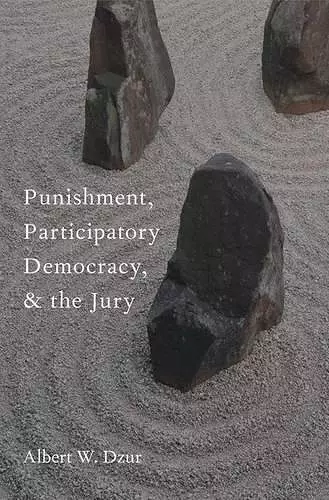Punishment, Participatory Democracy, and the Jury
Format:Hardback
Publisher:Oxford University Press Inc
Published:13th Sep '12
Currently unavailable, and unfortunately no date known when it will be back

Focusing contemporary democratic theory on the neglected topic of punishment, Punishment, Participatory Democracy, and the Jury argues for increased civic engagement in criminal justice as an antidote to the American penal state. Albert W. Dzur considers how the jury, rather than merely expressing unreflective public opinion, may serve as a participatory institution that gathers and utilizes citizen's juridical capabilities. In doing so, the book resists trends in criminal justice scholarship that blame increases in penal severity on citizen participation and rejects political theorists' longstanding skepticism of lay abilities. Dzur distinguishes constructive citizen involvement that takes responsibility for public problems from a mass politics mobilized superficially around single issues. This more positive view of citizen action, which was once a major justification for the jury trial, is now also manifest in the restorative justice movement, which has incorporated lay people into community boards and sentencing circles. Both jury trials and restorative justice programs, Dzur explains, are examples of rational disorganization, in which lay citizen action renders a process less efficient yet also contributes valuable qualities such as attunement, reflectiveness, and full-bodied communication. While restorative justice programs and participatory policy forums such as citizens' juries have become attractive to reformers, traditional juries have suffered a steep and troubling decline. Punishment, Participatory Democracy, and the Jury advocates a broader role for jurors in the criminal courts and more widespread use of jury trials. Though no panacea for a political culture grown too comfortable with criminalization and incarceration, participatory institutional designs that rationally disorganize punishment practices and slow down criminal justice can increase civic responsibility and public awareness about the need to find alternative paths forward for America's broken penal system.
"An elegantly written, wide-ranging, and finely textured account of juries as democratic institutions. Dzur argues that juries provide the most prominent, time-tested cases in which institutions are both limited and guided by the deliberative wisdom of lay citizens. In making the case, Dzur reverses the common notion that the key problem for democracies is to produce virtuous citizens. Rather, the task is to design institutions that transmit citizen virtues into collective governance. By moving the jury to the center of debates about participatory governance, Dzur is able to show how much we already know about designing deliberative and participatory institutions." --Mark E. Warren, Harold and Dorrie Merilees Chair in the Study of Democracy, University of British Columbia "Albert Dzur has written a lively, accessible, and very incisive book. He argues persuasively for the importance of democratic participation in the American criminal justice system as an antidote to overcriminalization and mass incarceration. He demonstrates deep sensitivity to character of the American jury trial and the distinctiveness of American public culture. This is political theory at its most lucid and helpful!" --Robert P. Burns, Professor of Law, Northwestern University, and author of The Death of the American Trial and A Theory of the Trial "Like many others, Albert Dzur deplores the 'penal populism' of recent years in the United States. Unlike others, however, he vigorously defends the jury as a form of 'democratic justice' that is superior to the 'technical' or 'expert' justice others are advocating. This defense, moreover, is only one facet of an intriguing and insightful exploration of the ways in which restorative justice and participatory democracy converge in 'a juridical form that allows citizens to own up to their laws.' Political theorists, criminologists, lawyers-anyone who cares about law and democracy-should read this book." --Richard Dagger, E. Claiborne Robins Distinguished Chair in the Liberal Arts, Professor, Political Science and PPEL, University of Richmond "In this readable and engaging book Albert Dzur certainly makes a compelling argument on behalf of the contemporary relevance of the jury as a site of responsible participation and learning. He achieves much more than this, however. Dzur succeeds in refocusing the debate on the vagaries of recent penal politics around a contrast between our current condition of spectatorship and a much more stringent and challenging vision of democracy. This is a timely, original and impassioned work." --Richard Sparks, Professor of Criminology, School of Law, University of Edinburgh "The author makes a strong case for more extensive use of jury trials. The book may be compared with the classic We, the Jury, by Jeffrey Abramson. The book contains excellent footnotes and a very useful and detailed bibliography. ... Recommended" --CHOICE "Dzur's fascinating and theoretically rich defense of the jury should be of interest to a wide array of scholars working on the criminal law, theories of democracy, and even models of bureaucratic functioning." -Sean McKeever, Journal of Moral Philosophy
ISBN: 9780199874095
Dimensions: 160mm x 239mm x 23mm
Weight: 454g
240 pages